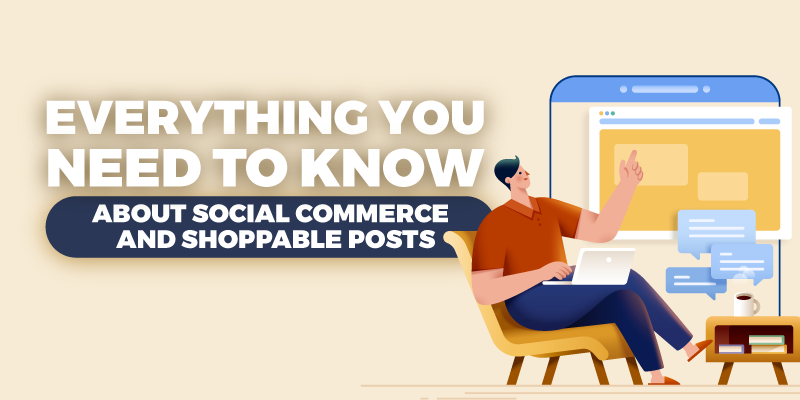Thanks to social media, brand-to-consumer interactions have evolved tremendously in the past few years. Given that these all-in-one platforms can increase brand awareness and drive sales, many companies now have a dedicated Facebook or Instagram page. Aside from being highly effective advertising channels, they have great potential for simplifying customer transactions.
Enter Social Commerce, which refers to using social media channels to sell products and services. By creating shoppable posts and the like, customers can now directly buy from your Facebook or Instagram page.
Social commerce refers to the practice of using social media to promote and sell products. Unlike social media marketing that aims to redirect your customers to your page, it gives customers the option to buy directly from your business page. Removing unnecessary steps in your transaction will ultimately increase the likelihood of a purchase.
Unfortunately, many business owners tend to neglect social commerce, causing them to miss out on several conversion opportunities. To help you close in on more deals, the guide below will tell you everything you need to know about social commerce and shoppable posts.
Social media has evolved in the past few years. During its early days, platforms such as Facebook merely serve as networking sites to connect you with your friends. Fast forward to today, and it has transformed into a promising marketplace that opened opportunities to entrepreneurs.
We know for certain that social media will continue to be relevant in the years to come, with more and more people entering the digital sphere. And considering that platforms such as Facebook have 1.47 billion daily users, adopting social shopping options will grant you more sales opportunities through social commerce.
3 Types of Shoppable Content
A shoppable post is any content that gives your customers a direct opportunity to purchase. If you’re a clothing retailer, you can add a shop now button on a product image or an order link to a video caption. Since 30% of online shoppers are likely to buy from a social media site, you can use this tendency to your advantage.
- Facebook and Instagram Posts
When posting on Facebook or Instagram, businesses can use creative photographs and video snippets to give customers an idea of what the product will look when worn, applied, or used. Place a shop option in your posts to guide your customer to the shopping cart instantly.
- Facebook Shop Collection
Facebook Shop is a business page feature that allows you to create an online store. Users visit your page then click on the Shop tab to access your product catalog and discover your offers easily. It may even encourage them to share it with their friends.
- Facebook and Instagram Stories
Considering that Stories are only seconds long and disappear after 24 hours, businesses tend to overlook its value. Despite being temporary, Facebook and IG stories can be used to showcase your products or get real-time engagements from your audience. In turn, this can help you build a stronger relationship with them and aid you in product development.
How to Get Started with your Facebook Shoppable Post
With the points above in mind, it’s clear that social commerce can do wonders for your business. If you’re looking to start a shop on Facebook, here’s what you need to do.
- Create a Facebook Commerce Manager account.
- Be a Business Manager admin.
- Own your Facebook Page and catalog in the same Business Manager.
- Acquire manage page permissions for the catalog in Business Manager.
- Comply with Facebook’s ecommerce policies.
3 Brands Winning at Facebook Shopping
The best way to maximize the platform is to learn how others are using it. Here are three brands that are winning big with Facebook Shopping.
- Avon – The beauty supply store does an excellent job of using product demos to drive sales. By tagging the products used in their posts, enticed shoppers can immediately proceed to the checkout counter.
- Decathlon – Apart from having affordable rates, the sporting goods retailer is one of the few brands that maximize Facebook shopping. Once visitors enter the Shop tab, they’ll immediately gain access to running shoes, cycling accessories, and more.
- Rosegal – Rosegal has a habit of posting products from different angles. Combined with an engaging caption and a shop now button, it’s no surprise why the brand is enjoying social commerce success.
How to Get Started with your Instagram Shoppable Post
Along with Facebook, Instagram is one of the most popular networking platforms in the world. Research shows that Instagram shoppable posts can increase page traffic by 1416%, so maximizing this feature should be a no-brainer. Here are the requirements for starting up an Instagram shop.
- You must have an Instagram account and be located in one of the 46 countries that the feature is currently available.
- You must be on the latest version of the Instagram app on your device.
- Your business must sell physical goods that comply with Instagram’s merchant agreement and commerce policies.
- Your business profile must be connected to a Facebook catalog.
3 Brands Winning at Instagram Shopping
Are you looking for some inspiration? Here are three brands that are using IG shoppable posts effectively.
- Adidas– Adidas collaborates excellently with their sponsored athletes. By combining the power of storytelling and IG’s shop features, brand loyalists are inspired to make quick transactions.
- H&M – The top fashion retailer has turned their Instagram profile into a virtual store. By tagging their products in promotional photos and videos, followers shop directly through the brand’s posts.
- Lush Cosmetics – Lush uses IG stories for audience interaction. They leverage polls, Ask Me A Question stickers, and other engaging features to entice them towards a purchase.
6 Social Commerce Best Practices
- Run promotions, giveaways, and competitions – Your customers won’t say it, but they love getting free stuff. Whether it’s a new product or a coupon for their next purchase, consider holding a giveaway on your page. Running these will keep your followers engaged and increase brand awareness in your chosen platform.
- Harness influencer marketing – From local celebrities to loyal customers, don’t hesitate to collaborate with influencers. Research shows that 49% of social shoppers heavily rely on influencers for their purchasing decisions.
- Ask your audience to vote on product styles and ranges – Use Instagram stories to learn more about your customers. Running polls, placing question stickers, and starting quizzes will give you valuable insights you can use in product and content development.
- Create shoppable content – Whether it’s an image, video, or blog, you should always create a ton of shoppable content. These will let you streamline the customer’s journey and capitalize on purchasing intent.
- Drive traffic to an automated checkout – You may have an amazing product line-up, but it won’t matter if your customer service is poor. Placing self-service options or investing in automation tools are some excellent ways to provide a seamless customer experience.
- Maximize user-generated content (UGC) – As you know, customers naturally trust their peers for product feedback. UGC has been shown to boost conversions by an average of 161%. More importantly, images of real people can help increase your conversion rate by 35%.
Instead of using stock images, use photos from your audience. Encourage photo submissions, or start a hashtag campaign. You can then ask for your customers’ permission to use their images for promotions. UGC is an excellent way to show social proof. It can cement your credibility and bolster collaboration.
Final Takeaways
From ad targeting to shoppable posts, it’s evident that there are many benefits to using social media for business. Considering that the market is becoming more competitive by the minute, eliminate the bottlenecks that prevent customers from purchasing from you.
If you aren’t yet, start maximizing Facebook and Instagram’s shop features to boost sales. Contact us today to learn more.






